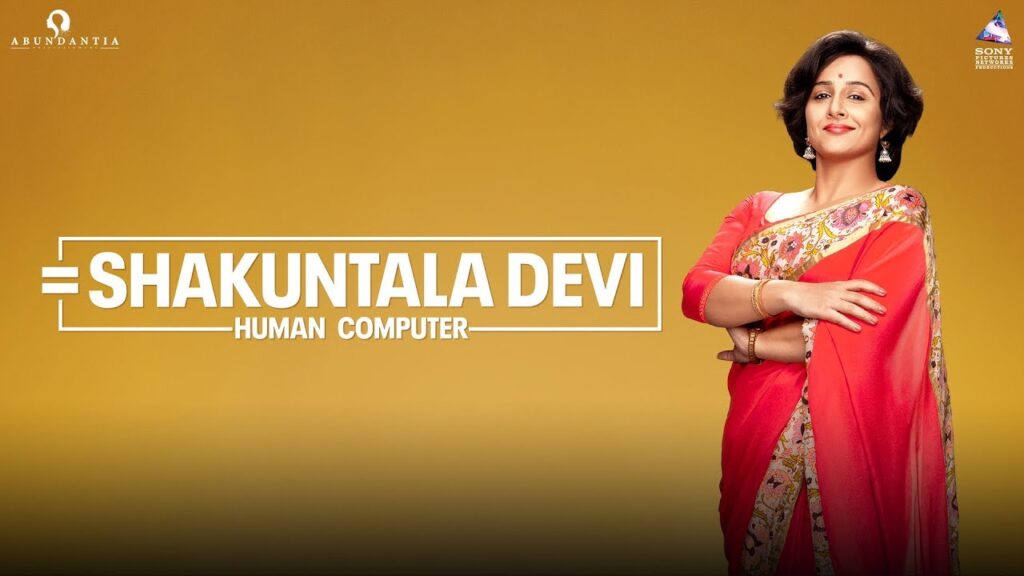
In recent years, we have come no closer to humanising people in the spotlight. Shakuntala Devi—the eminent mathematician, a politician, an astrologer, and the ‘human computer’— herself has been a part of our lives fleetingly. We have looked at her as a figure that is foreign to us, but Anu Menon’s biopic shows that the human-computer was still a human first. Attaching a personality and a story to a computer isn’t enough; her character, played by Vidya Balan, is portrayed as a larger than life person who always had a different perspective on life. It also draws parallels between her relationship with her mother and the one with her daughter.
The movie goes back and forth between two timelines. One starts from Shakuntala’s childhood, where she develops her bold and strong-headed personality; the other is about her losing control in a rocky relationship with her daughter. The beginning of the movie deals with the unusual childhood of Shakuntala Devi. She has to deal with doing math shows, not going to school, and the tragedy of losing her sister. We get insights into a rural Indian family in the 1930s— without the privilege of healthcare and caught up in the prevalent patriarchal society. Labeled as a progressive thinker, Shakuntala raises her voice against her own parents for not saving her sister. She questions her father’s role when she is the sole breadwinner of the family. She resolves to become a ‘badi aurat’ and break this system which marginalises women out of jobs and success.
Shakuntala, as a grown woman, continues displaying her math abilities in front of the crowd in Bangalore. Having had received sexist comments from men at these shows, she ends up silencing with her genius. After a failed relationship, she moves to England and tries to start a new life. The atmosphere of India’s post-Independence period trickles into Shakuntala’s own independent spirit. As she astounds everyone with her quick math-solving skills, the bright-eyed young Shakuntala gets engrossed in the Western lifestyle of parties and success, only to receive yet another heartbreak. “Why does a man want a woman to need them?” she exclaims to her lover as he leaves her, saying she does not need him anymore.
The men in Shakuntala’s life rarely stayed. In her time, the men usually experienced discomfort when they saw a woman who didn’t fit a stereotypical gender-based role in a relationship. Even as Paritosh Bannerji, played by Jisshu Sengupta, enters her life and they marry, her controlling nature interferes with her love life. We see its consequence when she separates her daughter, Anupama, from her father. There’s a parallel to be drawn here between the personality traits of Shakuntala and her own father. Their possessive nature deprived their children of their childhood and schooling.
As a married woman, Shakuntala conforms to being a wife and a mother. However, it doesn’t last long as her passion for being on stage is overpowering. She is a woman who is vehemently in love with mathematics and her lucrative shows. The couple agrees to continue her shows, while Paritosh looks after their daughter.
Shakuntala’s love for mathematics and her daughter clash swords throughout the movie— to the point where she separates from her husband just to take her daughter to her shows all around the world. Anu asks for her father as she grows up, but Shakuntala makes sure there is no contact between them. Caught up between a lack of fatherhood, fame, and the absence of her mother in her life— Anu grows up to despise her mother and even vows to never be like her. She asks to have regular schooling in order to stay away from her mother, to which Shakuntala agrees after some convincing from Paritosh.
The mother-daughter relationship is that of love and hate. As Shakuntala gives us another glimpse of her progressive thinking when she writes a book on homosexuality (being one of the first Indians to write about it), she pronounces her ex-husband as gay setting Anu off. There are various shifts in the timeline throughout this segment as the two are shown to have their own moments of love and separation.
The final timeline shows Anu as a married woman with a child. She struggles with her career and motherhood, just like Shakuntala. This can be seen as one of the most prominent parallels of the movie. While Anu vowed to never be like her mother, she too conforms to the norms of a mother handling children and the household. However, her resentment towards her mother never fades. Through various dramatic events, Shakuntala and Anu come face-to-face, only to realise that their mothers had cared for them all along. As they amend their relationship in a deeply emotional scene, the audience around them dismisses them by saying, ‘mothers-daughters’— to imply how this emotional chaos is just a part of their lives.
A hearty feel-good comedy by Menon, Shakuntala Devi has shown less of her career life. It emphasises on the free-spirited, emotional, and vulnerable woman who people called a human-computer. The aspect of her motherhood has humanised Shakuntala in the eyes of the viewers. There was beauty in her imperfection, and the portrayal of her character in the movie truly reflects that. She remains in our hearts as a woman remarkably unique and ahead of her times.
Written by Aniket Awasthi for MTTN
Edited by Tulika Somani for MTTN
Featured Image from Google Images